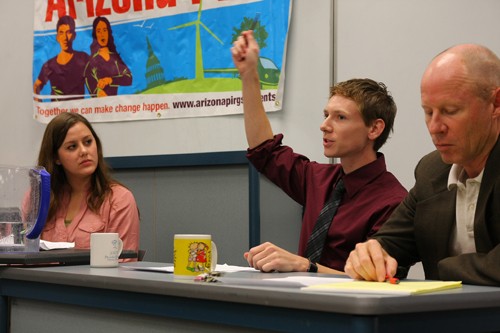Arizona PIRG and the Environmental Law Society discussed sustainable issues and solutions at their “”Substance and Sustainability”” panel at the James E. Rogers College of Law last night.
The panel consisted of four members including professors, a research associate with Arizona Research Institute for Solar Energy and the director of Arizona Public Interest Research Group, also known as Arizona PIRG. The mediator began by providing a definition of sustainability as “”the capacity to maintain and continue support of a structure”” for the panel members to add to.
“”We are doing research to see how we can make use of our renewable natural resources … so that those things will continue to be around for awhile,”” said Shirley Papuga, assistant professor in the School of Natural Resources.
Lon Huber, program associate for the materials science and engineering department and a research associate with Arizona Research Institute for Solar Energy added that, economically, sustainability means fostering innovation while also implementing policies that provide stability for the marketplace.
Being green seems to be a growing trend, especially among college-aged students, the mediator said. The question is whether students following a trend are a suitable support system for the green movement.
“”I’d like to think that being green has become more mainstream,”” said Diane Brown, executive director of Arizona PIRG. “”It seems like everywhere you look people are talking about it. If you look throughout history … civil rights, women’s rights … students were at the forefront of leading those.””
Americans, however, may give themselves too much credit in thinking that because they have switched off a light bulb, they’ve made a big contribution to the environment, Huber said.
“”You see ads on TV and you think … companies are really stepping up to the plate on this and we don’t really need to do too much because the private sector has got it covered,”” Huber said.
It is important to understand what can actually be considered “”green”” as far as businesses and corporations and the steps that they can take to be environmentally friendly, Papuga said.
“”It’s really complicated to come up with a certain set of criteria that’s sustainable, that’s green,”” Huber said. “”It’s not black and white, that’s for sure.””
The public must be aware of statistics and numbers and put them into context. Marketing strategies, as the panel addressed, might portray something to be environmentally friendly when it is not. This is known as “”greenwashing.”” Companies may use this practice to try to improve their image.
“”As a consumer and a citizen … just because a company advertises something in a certain way doesn’t mean I’m going to take that at face value,”” said Stan Reynolds, an economics professor. “”I think it’s important to look at what companies are actually doing.””
Consumers can take initiative by using common sense as well as looking more closely at the products they buy and whether or not the manufacturers can back up what their products claim, Huber said.
“”One of the things we encourage people to do is to really look behind the ads and to find out where the money is going,”” Brown said.
The public should be aware of how the businesses they support spend their money to determine if they are investing in renewable sources of energy or just an attractive billboard, Brown said.
At the same time, Reynolds said that people should not worry about businesses potentially capitalizing on the green craze. Businesses must give consumers what they want in order to make money, and if people demand environmentally friendly products, then businesses will deliver.
“”There are companies out there looking for ways to innovate, to provide better products, products that use fewer toxic chemicals, products that are less harmful to the environment,”” he said.
Papuga said a collective effort is more effective in changing environmental policies.
“”If we work together to ensure that there’s a law that basically says you can’t excessively package your product, that’s going to do far more than if every one of us in the room doesn’t buy that product,”” Papuga said.
There are a number of things happening now, such as a decrease in the supply of fossil fuels and an increase in population growth, that will require people to be sustainable even if they did not originally plan on it, Reynolds said.
“”Is it likely we’re going to sit on our hands and do nothing?”” Reynolds asked. “”I don’t think it is. I think we’re going to be moving at least in the right direction, just not as fast as some might hope.””









